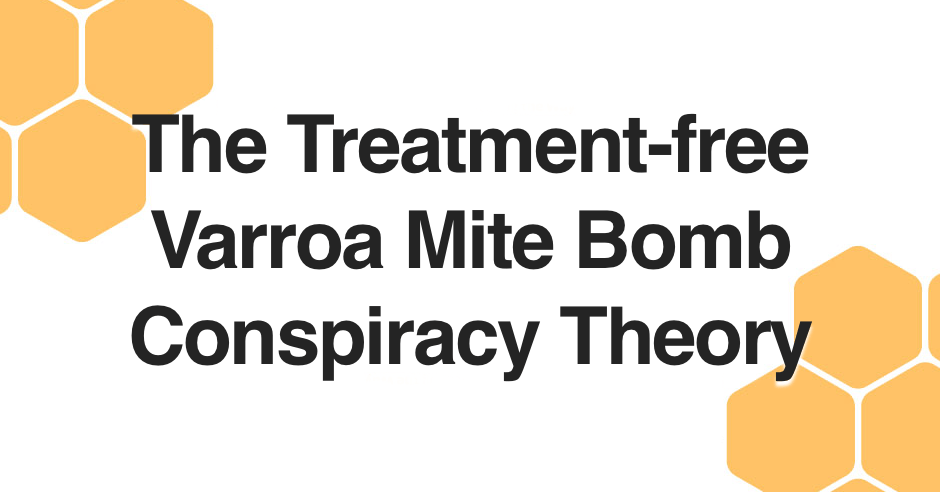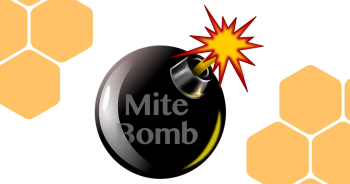The fact is that beekeepers who treat their bees with chemicals are still losing colonies in a similar ratio to those of treatment-free beekeepers.

What I believe is that, over time, raising bees without treatments produces hardier bees. Treating bees with chemicals helps the bees that have weaker “genetics” to continue to propagate and allows the strongest mites to breed more, stronger mites.
One common argument that beekeepers who treat their bees will continually bring up as their first or second defense is the notion of “mite-bombs” in correlation to drifting and robbing. Yes, drifting of drones into other colonies does occur and robbing of weak colonies does take place regularly. But, try thinking about it this way… even if all the managed hives in the world were treated, the feral colonies that exist out there (and believe me… there are a lot) will still remain untreated. If a feral colony happens to begin dying of mite infestation, there is nothing we can do to stop the spread of mites from taking place anyways.
If you are a treatment-free beekeeper and you are afraid of being labeled unneighborly or irresponsible, do not be dismayed. It just comes with the territory of standing up for what you believe and standing up for science. I’m here to tell you that you DO NOT need to feel all alone and you can feel secure in your beliefs.
 Contrary to the supposed wisdom of the “mite bomb” theory, mature feral colonies and established, overwintered, treatment-free colonies are actually “mite black holes” or “mite vacuums” such that when mites are brought into the hive, they don’t leave alive! These hives actively eliminate mites from the environment and having them in the vicinity of other hives is good for the population, as they contribute to herd immunity.
Contrary to the supposed wisdom of the “mite bomb” theory, mature feral colonies and established, overwintered, treatment-free colonies are actually “mite black holes” or “mite vacuums” such that when mites are brought into the hive, they don’t leave alive! These hives actively eliminate mites from the environment and having them in the vicinity of other hives is good for the population, as they contribute to herd immunity.
Beekeepers across the United States lost 33% of their honey bee colonies during the course of the year spanning April 2016 to April 2017. Winter loss rates were at 21%, while Summer loss rates were 18%. [1] For the year of 2015-2016, over 44% of colonies were lost over the course of the year. Winter loss rates were near 28%, and Summer loss rates were also around 28%. [2]
If your hive dies out in winter from mites, the mites will already be dead by the time other colonies come around and start robbing, so, this supposed “mite-bomb” issue might not even apply for a portion of the year in colder regions of the world in the first place.
The national Bee Informed survey also shows that losses sustained by non-treating beekeepers was nearly the same as losses seen by treating beekeepers. As I’ve stated before, in another article I’ve written … if there’s not much of a reported difference in loss, why not just save your money and stop buying chemicals?!
In closing, one more point to mention is… if your colonies are not susceptible to mite infestations (if they have become mite-resistant) they can not become mite-bombs. In many treatment-free beekeepers’ opinions, the true source of mite-bombs are actually the treated hives that can not deal with Varroa on their own accord. These are the colonies that are fail in the Fall due to heavy mite load even after being treated and then become susceptible to robbing, which, in turn produces the dreaded and supposed mite bomb.
So, is it really unneighborly or irresponsible to not treat your bees? You tell me!










11 Comments
Hives that require treatment to survive will swarm like any other hive. The swarms that end up in tree cavities and other feral colony sites can’t be treated for mites, and they usually end up within a mile of the parent colony. If they collapse from mites and get robbed out whose fault is that? I suspect that there are more escaped swarms from treated hives annually than there are managed treatment-free hives in the entire U.S. My own treatment-free hives don’t collapse and get robbed out. Seems to me that the source of the mite bombs is the beetreaters themselves by virtue of their own management practices.
For the last 10 years I have been teaching new beekeepers how to keep their bees alive without using any chemicals and they are having great success. The only hives they lost were ones purchased from a local seller that had inferior bees/queens. Of course when they all died, it was the new beekeeper’s fault. The story never ends with some folks that can’t see the forest for the trees and continue to poison their own hives with chemicals. I say to each his/her own and do what you need to do without worrying about what others say. Until they buy my bees they need to go their own way and stop worrying about what others do. Of course they have to blame someone for their failures. It couldn’t be they are wrong. LOL
“So, is it really unneighborly or irresponsible to not treat your bees? You tell me!”
yes
At least kill the hive (and mites) before it can be robbed. Then use the honey and comb on your terms.
WE LOST TWO HIVE OVER THE LAST 2 YEARS. YES THEY WHERE PURCHASED LOCALLY . SO WHERE OR WHO WOULD BE A GO PLACE TO GET A STRONG HIVE
Hello to you; well I am going to disagree with you on this from just reading your first few sentences on this subject. Trying to be treatment free is nothing new, beekeepers have been trying for YEARS, and to emphasize this statement, A REALLY REALLY REALLY long time to get those “hardy” bee’s to purchase to no avail as of yet. The genetics disappear eventually. I am not saying it is impossible, there are beeks that claim this, but I think it is all management that needs to be learned from an experienced beekeeper who knows the science of honey bees and how to achieve this. Most new beekeepers have a save the bee’s mentality and the anti- Monsanto/Bayer mentality and are truly mite- bombs unfortunately for us other beeks near them.
As for your last two paragraphs most colonies ARE susceptible to varroa mites. Have a conversation with Dr. Tom Seeley of Cornell, Randy Oliver and the scientists on the honey bee forum Bee-l; Rusty Burlew of Honey Bee Suite, Dr. Jerry Bromenshenk of U of Montana who teaches a Master Beekeeping Class there. I think we need something much more complicated thst will alter the mites DNA to help our honey bees. And let’s not forget all the other pollinators out there; the phrase ” if the honey bees die we will lose ⅓ of our food” is ridiculous. We will get there eventually but just not yet. Thanks for your blog.
Please read this, not because it’s from ‘Randy Oliver’, but because it’s logical well thought out science based management. “What you believe” should not come into play when responsibly managing bees or any creature. Leave human emotion & any anthropomorphic BS out of it. *Note citation #10, Mite bombs are real!(Great study, thank goodness for those grad students tracking all those bees).
http://scientificbeekeeping.com/the-varroa-problem-part-6b/
Well before your hive collapses from mites, the bees will become infected with viruses that Varroa transmits to them. We now know that these viruses can be transmitted to wild bees in the area, impacting their health.
So it’s not just your neighboring beekeepers who you’re impacting by refusing to manage varroa. You’re causing reductions in wild bee health.
Treat your bees. Unless you carefully control your genetics at a very sophisticated level, there’s too much gene flow in and out of your operation for you to have any meaningful control on natural/artificial selection.
If you still don’t want to treat, consider reducing the size of your hives down to 1 full body (no honey supers). This will encourage the bees to swarm much more often, which will naturally create a brood gap that is very effective at minimizing Varroa. Obviously you will get less honey this way, but you’re also less likely to reduce overall pollinator health in your neighborhood.
Back in the 60’s, I grew up with Bees and at one time, my Dad had about 30 colonies. Those days are what I call the “pre mite” days, and the Bees did well. I wish my Bees could have the same prosperity that my Dad’s did. In this article, the writer talks about feral Bees and how there are some out there that are mite free due to grooming, etc. So where are these Bees? I’d love to have them as my primary colonies. I believe they are dying at the same rate but the idea of a chemical free Nirvana colony just doesn’t exist. The universities and breeders and working towards the colonies that do help sanitize the hive (Hygenic), but that’s not a success yet if I’m not mistaken. So, it’s my take that we’re just talking Nirvana….fumigate the colony and help them survive. Once they come up (or find) the colonies that do actually kill the mites, Nirvana will have arrived.
I agree with the treatment free mentality. I propagate what I call “survivor” bees.
You do realize the only way your plan works is if you just about live on an island and control 100% of the drone population in your area with no other outside influence whatsoever right? There’s the science for you. If there are as many “feral colonies” as you say they’re are, the way gene coding works is the traits you’re trying to achieve for in honeybees sound be watered down within less than a few months due to the life cycle of spring bees vs winter bees. There’s the science for you and the funny thing is anyone who actually keeps bees more than just a hobby can quickly see you have absolutely no clue what you’re talking about.